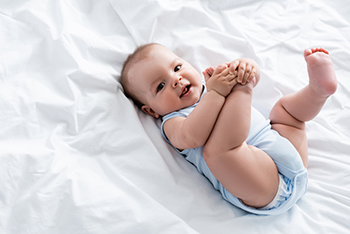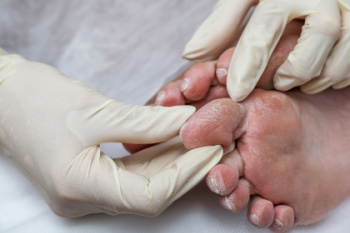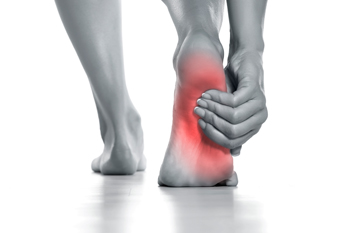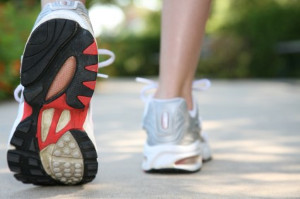Items filtered by date: May 2024
Genetics and Congenital Foot Problems

Genetics can play a significant role in the development of congenital foot problems, particularly in pediatric patients. Common deformities such as clubfoot, flat feet, and metatarsus adductus often manifest at birth or during early childhood. Clubfoot is characterized by a twisted foot that points downward and inward, whereas flat feet involve a lack of arch in the foot when standing. Metatarsus adductus presents with the front half of the foot turned inward. These conditions are believed to occur due to a combination of genetic and environmental factors, although the precise causes are still not fully understood. Symptoms typically include abnormal foot shape, difficulty in walking, and discomfort. Treatment options vary from custom orthotics to surgical intervention, depending on severity. Prognosis is generally good with early treatment. If you are a parent and notice signs of foot deformities in your children, it is suggested that you schedule an appointment with a podiatrist for diagnosis and appropriate management.
Congenital foot problems require immediate attention to avoid future complications. If you have any concerns, contact Dr. John Branwell of Kearny, New Jersey. Our doctor can provide the care you need to keep you pain-free and on your feet.
Congenital foot problems are deformities affecting the feet, toes, and/or ankles that children are born with. Some of these conditions have a genetic cause while others just happen. Some specific foot ailments that children may be born with include clubfeet, polydactyly/macrodactyly, and cleft foot. There are several other foot anomalies that can occur congenitally. What all of these conditions have in common is that a child may experience difficulty walking or performing everyday activities, as well as trouble finding footwear that fits their foot deformity. Some of these conditions are more serious than others. Consulting with a podiatrist as early as possible will help in properly diagnosing a child’s foot condition while getting the necessary treatment underway.
What are Causes of Congenital Foot Problem?
A congenital foot problem is one that happens to a child at birth. These conditions can be caused by a genetic predisposition, developmental or positional abnormalities during gestation, or with no known cause.
What are Symptoms of Congenital Foot Problems?
Symptoms vary by the congenital condition. Symptoms may consist of the following:
- Clubfoot, where tendons are shortened, bones are shaped differently, and the Achilles tendon is tight, causing the foot to point in and down. It is also possible for the soles of the feet to face each other.
- Polydactyly, which usually consists of a nubbin or small lump of tissue without a bone, a toe that is partially formed but has no joints, or an extra toe.
- Vertical talus, where the talus bone forms in the wrong position causing other bones in the foot to line up improperly, the front of the foot to point up, and the bottom of the foot to stiffen, with no arch, and to curve out.
- Tarsal coalition, when there is an abnormal connection of two or more bones in the foot leading to severe, rigid flatfoot.
- Cleft foot, where there are missing toes, a V-shaped cleft, and other anatomical differences.
- Macrodactyly, when the toes are abnormally large due to overgrowth of the underlying bone or soft tissue.
Treatment and Prevention
While there is nothing one can do to prevent congenital foot problems, raising awareness and receiving neonatal screenings are important. Early detection by taking your child to a podiatrist leads to the best outcome possible.
If you have any questions please feel free to contact our office located in Kearny, NJ . We offer the newest diagnostic tools and technology to treat your foot and ankle needs.
How Podiatrists Help With Diabetic Foot Care
 Podiatrists play a key role when it comes to managing and preventing foot-related complications in diabetes patients. Foot issues are a common occurrence in diabetics, due to the poor blood circulation and nerve damage, or neuropathy, that often accompany the disease. Podiatrists specialize in early detection and treatment of potential foot problems like ulcers, infections, and structural issues. This makes regular check-ups with podiatrists important for someone who is at risk for these issues. During visits, a podiatrist will conduct comprehensive foot exams to look for signs of decreased circulation, changes in foot structure, or nerve damage. This foot doctor can provide guidance on proper foot care practices, such as how to safely trim nails and avoid injuries. Podiatrists may also recommend appropriate footwear to prevent pressure sores and injuries. Additionally, podiatrists can treat any current foot problems to prevent them from escalating into more serious conditions that could lead to amputation. By closely monitoring the health of a diabetic's feet, podiatrists help maintain mobility and prevent life-threatening complications. If you are at risk for foot complications due to diabetes, it is suggested that you add a podiatrist to your regular care team.
Podiatrists play a key role when it comes to managing and preventing foot-related complications in diabetes patients. Foot issues are a common occurrence in diabetics, due to the poor blood circulation and nerve damage, or neuropathy, that often accompany the disease. Podiatrists specialize in early detection and treatment of potential foot problems like ulcers, infections, and structural issues. This makes regular check-ups with podiatrists important for someone who is at risk for these issues. During visits, a podiatrist will conduct comprehensive foot exams to look for signs of decreased circulation, changes in foot structure, or nerve damage. This foot doctor can provide guidance on proper foot care practices, such as how to safely trim nails and avoid injuries. Podiatrists may also recommend appropriate footwear to prevent pressure sores and injuries. Additionally, podiatrists can treat any current foot problems to prevent them from escalating into more serious conditions that could lead to amputation. By closely monitoring the health of a diabetic's feet, podiatrists help maintain mobility and prevent life-threatening complications. If you are at risk for foot complications due to diabetes, it is suggested that you add a podiatrist to your regular care team.
Diabetic foot care is important in preventing foot ailments such as ulcers. If you are suffering from diabetes or have any other concerns about your feet, contact Dr. John Branwell from Kearny, New Jersey. Our doctor can provide the care you need to keep you pain-free and on your feet.
Diabetic Foot Care
Diabetes affects millions of people every year. The condition can damage blood vessels in many parts of the body, especially the feet. Because of this, taking care of your feet is essential if you have diabetes, and having a podiatrist help monitor your foot health is highly recommended.
The Importance of Caring for Your Feet
- Routinely inspect your feet for bruises or sores.
- Wear socks that fit your feet comfortably.
- Wear comfortable shoes that provide adequate support.
Patients with diabetes should have their doctor monitor their blood levels, as blood sugar levels play such a huge role in diabetic care. Monitoring these levels on a regular basis is highly advised.
It is always best to inform your healthcare professional of any concerns you may have regarding your feet, especially for diabetic patients. Early treatment and routine foot examinations are keys to maintaining proper health, especially because severe complications can arise if proper treatment is not applied.
If you have any questions please feel free to contact our office located in Kearny, NJ . We offer the newest diagnostic and treatment technologies for all your foot and ankle needs.
Addressing Foot Pain

Foot pain comes in various forms, each signaling potential underlying issues that should not be disregarded. Plantar fasciitis, a common cause of heel pain, results from inflammation of the plantar fascia ligament, often due to overuse or improper footwear. Morton's neuroma, characterized by a sharp, burning sensation in the ball of the foot, stems from the thickening of the tissue around a nerve, typically caused by pressure or irritation. Bunions, hallux rigidus, and stress fractures are additional examples of foot conditions that can cause discomfort and affect mobility. Ignoring foot pain can lead to exacerbated symptoms, decreased quality of life, and even chronic conditions that require more invasive treatments. Proper diagnosis and timely intervention are essential for addressing foot pain and preventing long-term complications. Consulting a podiatrist can help identify the underlying causes and develop an effective treatment plan to alleviate discomfort and promote foot health. If you have any foot pain, it is suggested that you confer with this type of doctor who can provide a diagnosis and treatment.
Foot Pain
Foot pain can be extremely painful and debilitating. If you have a foot pain, consult with Dr. John Branwell from Kearny, New Jersey. Our doctor will assess your condition and provide you with quality foot and ankle treatment.
Causes
Foot pain is a very broad condition that could be caused by one or more ailments. The most common include:
- Bunions
- Hammertoes
- Plantar Fasciitis
- Bone Spurs
- Corns
- Tarsal Tunnel Syndrome
- Ingrown Toenails
- Arthritis (such as Gout, Rheumatoid, and Osteoarthritis)
- Flat Feet
- Injury (from stress fractures, broken toe, foot, ankle, Achilles tendon ruptures, and sprains)
- And more
Diagnosis
To figure out the cause of foot pain, podiatrists utilize several different methods. This can range from simple visual inspections and sensation tests to X-rays and MRI scans. Prior medical history, family medical history, and any recent physical traumatic events will all be taken into consideration for a proper diagnosis.
Treatment
Treatment depends upon the cause of the foot pain. Whether it is resting, staying off the foot, or having surgery; podiatrists have a number of treatment options available for foot pain.
If you have any questions, please feel free to contact our office located in Kearny, NJ . We offer the newest diagnostic and treatment technologies for all your foot care needs.
Why Live with Pain and Numbness in Your Feet?
How to Find Your Running Solemate

Choosing the right pair of running shoes is vital for runners of all levels, as it can impact performance and prevent injuries. Understanding the different categories of running shoes can help you find the perfect fit for your needs. First, there are neutral shoes, designed for runners with normal arches who require cushioning and support. Then, stability shoes are ideal for runners with mild to moderate overpronation, providing additional support to help stabilize the foot. For those with severe overpronation or flat feet, motion control shoes offer maximum stability and control to prevent excessive inward rolling of the foot. Additionally, minimalist shoes provide a barefoot-like experience, promoting a natural running gait and strengthening foot muscles. Finally, maximalist shoes feature extra cushioning to absorb impact, making them suitable for long distance runners or those prone to joint pain. By understanding these categories and considering factors, such as foot type and running style, you can find the perfect pair of running shoes to support your fitness goals. If you have developed foot conditions from wearing the wrong type of shoes, it is suggested that you consult a podiatrist who can treat your specific foot ailment, and guide you on the right type of running shoes to purchase.
If you are a runner, wearing the right running shoe is essential. For more information, contact Dr. John Branwell from Kearny, New Jersey. Our doctor can provide the care you need to keep you pain-free and on your feet.
Choosing the Right Running Shoe for Your Foot Type
To increase performance and avoid the risk of injury, it is important to choose the right running shoe based on your foot type. The general design of running shoes revolves around pronation, which is how the ankle rolls from outside to inside when the foot strikes the ground.
- Neutral runners are able to choose from a wide variety of shoes, including minimalist shoes or even going barefoot.
- Runners who overpronate, or experience an over-abundance of ankle rolling, should choose shoes that provide extra motion control and stability.
- Runners who underpronate, or supinate, have feet that have high arches and lack flexibility, preventing shock absorption. They require shoes with more flexibility and cushion.
If you have any questions please feel free to contact our office located in Kearny, NJ . We offer the newest diagnostic and treatment technologies for all your foot and ankle needs.

